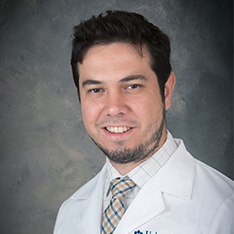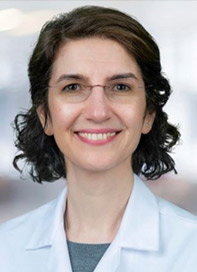Thyroid cancer happens when cells in the thyroid gland grow abnormally and uncontrollably. Blood tests, imaging and biopsy are used to diagnose thyroid cancer. Treatment options may include removal of the thyroid, thyroid hormone therapy, radiation and chemotherapy.
Generally, thyroid cancer is highly treatable, and many patients make a full recovery.
What Is Thyroid Cancer?
Thyroid cancer is an abnormal growth of cells in the thyroid, which is a small gland at the base of your neck under the Adam’s apple and above the collarbone. These cells may grow uncontrollably and form a tumor.
Thyroid cancer starts in the thyroid but can spread (metastasize) to other parts of the body. Metastasis is more common in medullary thyroid cancer than papillary thyroid cancer.
Prevalence
About 44,000 cases of thyroid cancer are diagnosed in the U.S. each year, according to the American Cancer Society.
Women are three times more likely to have thyroid cancer. It is less common in Black patients than any other racial group.
Prognosis
Generally, thyroid cancer is found early in many patients and is highly treatable. The prognosis for many patients is very good.
If you have thyroid cancer, ask your doctor about treatment options and outlook.
Types of Thyroid Cancer
There are different types of thyroid cancer that develop in either the follicular or C cells of the thyroid.
Papillary Thyroid Cancer
Papillary thyroid cancer is the most common type, accounting for about 80% of thyroid cancers. It starts in the thyroid follicular cells.
It grows very slowly and can usually be successfully treated, even if it spreads to the lymph nodes.
Follicular Thyroid Cancer
Follicular thyroid cancer is the second most common type and accounts for about 10% of thyroid cancers. It starts in the thyroid follicular cells and rarely spreads to the lymph nodes.
It’s more common in countries where people don’t get iodine in their diet. In the U.S., we get iodine in table salt.
Anaplastic Thyroid Cancer
Anaplastic thyroid cancer is also called undifferentiated thyroid cancer. It is very rare and hard to treat because it grows quickly.
Medullary Thyroid Cancer
Medullary thyroid cancer is the rarest form of thyroid cancer, accounting for about 2% of cases. It forms in the C cells of the medulla, which is the inside of the thyroid.
Medullary thyroid cancer is more likely than other types to spread to other parts of the body.
Symptoms of Thyroid Cancer
Thyroid cancer doesn’t always cause symptoms in the very early stages.
Symptoms may include:
- Difficulty swallowing or breathing
- Pain in the neck and throat
- A lump in your neck
- Hoarse voice
- Swollen lymph nodes
Diagnosing Thyroid Cancer
Your doctor will ask about your symptoms and perform a physical exam, feeling your neck for lumps (nodules) on the thyroid gland. They will then perform the necessary diagnostic studies as detailed below.
Blood Tests
Blood tests to measure the thyroid's function and hormone levels include:
- Thyroid-stimulating hormone (TSH)
- T3 and T4 thyroid hormones
- Calcitonin for people with medullary thyroid cancer
- Carcinoembryonic antigen (CEA) for people with medullary thyroid cancer
Imaging
Imaging tests will give your provider a better look at the thyroid gland. They can check for inflammation, swelling and nodules (growths).
- Ultrasound uses sound waves to create an image of the thyroid gland. It can show any nodules on the thyroid and determine if they are solid, which indicates cancer.
- A small amount of radioactive iodine is swallowed or injected into a vein. A scan shows how the thyroid absorbs the iodine.
- CT scan uses X-rays to get a detailed image of the body and determine the location and size of tumors.
Biopsy
A biopsy test extracts a small amount of thyroid tissue to study under a microscope. It may be done surgically or with a very thin needle guided by ultrasound imaging.
Stages of Thyroid Cancer
Cancer stages are numbered 1-4 with lower numbers indicating the cancer is still contained in the thyroid. The higher numbers indicate the cancer is more advanced as it has spread to other parts of the body.
Staging will vary depending on the type of thyroid cancer. Read more about thyroid cancer staging in the Health Library.
Causes and Risk Factors
For the most part, there are no clear causes of thyroid cancer. Some factors may put you at a higher risk for thyroid cancer, including:
- Genetics: About 25% of medullary thyroid cancers are attributed to multiple endocrine neoplasia type 2 (MEN2), which is a genetic condition.
- Sex: People assigned female at birth are three times more likely to have thyroid cancer.
- Radiation exposure: Radiation treatments to your head, neck and throat as a child, or exposure to nuclear fallout put you at a higher risk.
- Iodine deficiency: This is uncommon in the U.S.
- Goiter: Having enlarged thyroid (goiter) increases your risk.
Preventing Thyroid Cancer
For people at an average risk for thyroid cancer, there is no guaranteed way to prevent it.
People with a higher risk for medullary thyroid cancer due to the inherited MEN2 gene may consider thyroidectomy (surgery to remove the thyroid).
Treatment Options
Treatment of thyroid cancer will depend on your age, the type and stage of the cancer, and your overall health. Advanced thyroid cancer may require more aggressive treatment.
Surgery
Your provider may recommend surgery to remove part or all of the thyroid to ensure removal of all cancerous cells. This is the most common treatment.
Radioactive Iodine
With this treatment, you’ll swallow the radioactive iodine in liquid or pill form. Your thyroid absorbs iodine, so the radioactive iodine will be absorbed by cancerous cells that may linger in the body after surgery.
The risk of it harming other cells is very low, and the radioactive iodine will be expelled in your urine in the days after the treatment.
Thyroid Hormone Therapy
You’ll need to take thyroid hormone replacement after surgical removal of the thyroid or if it isn’t producing enough hormone. It also slows the growth of cancerous cells.
Targeted Drug Therapy
These medicines target specific changes found on some thyroid cancer cells. If your cancer cells have these changes, targeted therapy can be used to kill those cells, while causing little to no damage to healthy cells.
These medicines may be used if other treatments aren't working or the cancer comes back after treatment.
Radiation Therapy
High-energy X-rays can precisely target cancer cells in your body. It’s often used if other treatments did not kill all cancer cells or if the cancer returned.
Chemotherapy
Chemotherapy is used to treat fast-growing cancer cells. It is a chemical drug treatment given in pill or IV form.
Frequently Asked Questions
Is thyroid cancer curable?
Yes, thyroid cancer is a very treatable condition. Most patients have an excellent prognosis after treatment. Your prognosis will depend on the stage of your cancer and overall health.
Does thyroid cancer spread quickly?
The rate of the cancer growth will depend on what type it is. Papillary thyroid cancer grows slowly and can be treated if caught early. Other types of thyroid cancer grow more quickly and will require more aggressive treatment.
What is the life expectancy of a person with thyroid cancer?
Life expectancy or survival rate will depend on a number of factors, including type of thyroid cancer, cancer stage, treatment success and overall health. Five-year survival rates are more positive when the cancer is still contained to the thyroid.
Most thyroid cancer cases (80%) are papillary thyroid cancer, which is the most treatable thyroid cancer. The five-year survival rate for papillary thyroid cancer is 99.5% according to the American Cancer Society.
Medullary and anaplastic thyroid cancers are more aggressive and have lower survival rates, but they are much rarer than papillary.
Ask your provider for specific information about your condition.



